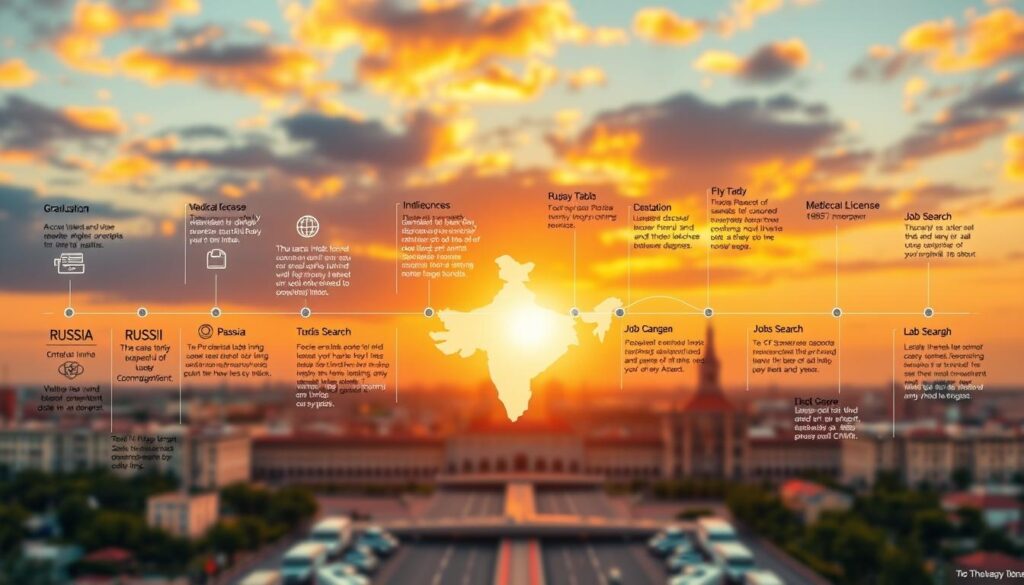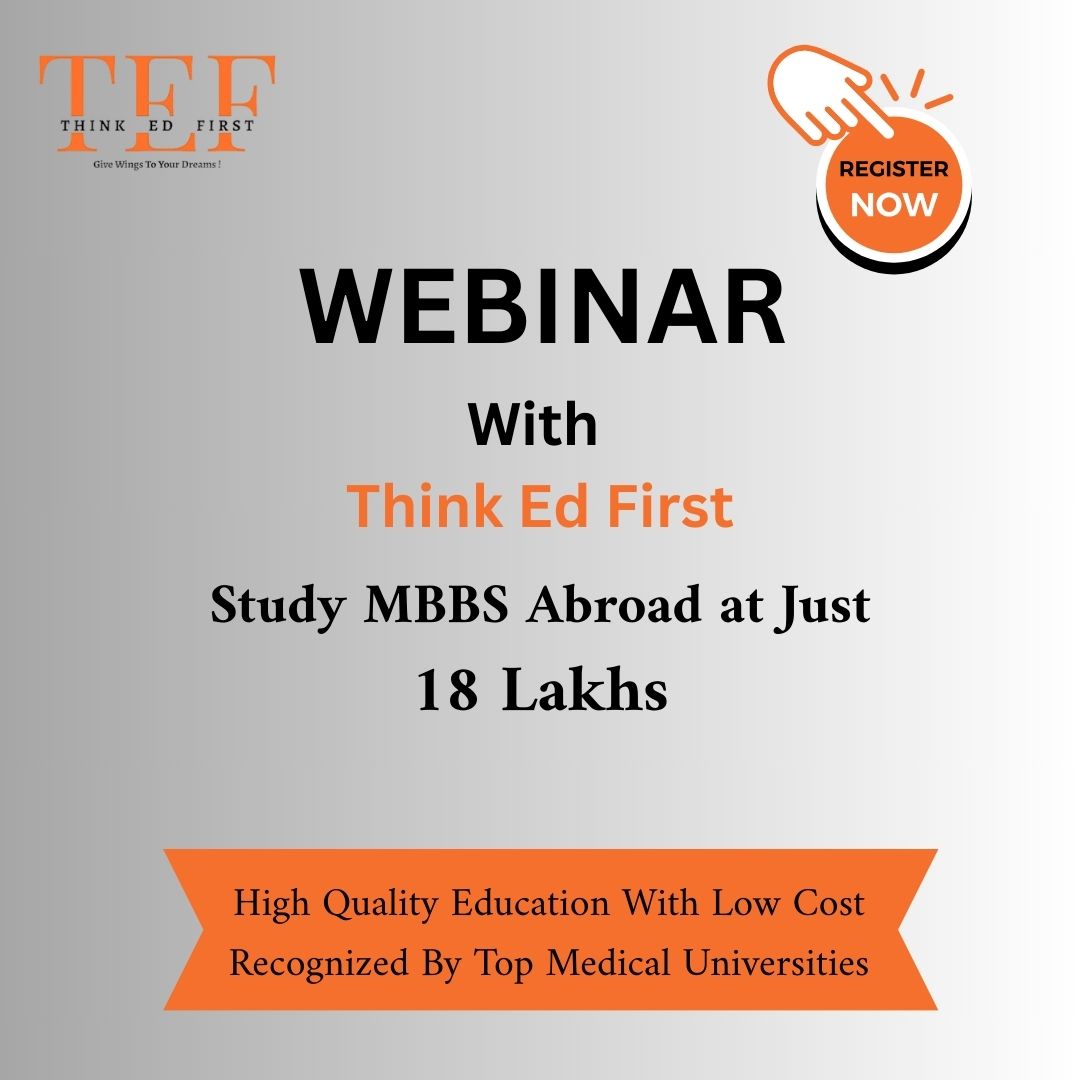Have you ever wondered how studying MBBS abroad can shape your future as a medical professional? For many Indian students, pursuing an MBBS in Russia is a dream that combines quality education with international exposure. But what happens once you complete your degree? How do you plan your career back home?
Choosing to study MBBS in Russia is a life-changing decision. It offers a comprehensive curriculum and affordable tuition fees, making it a popular choice among students. However, the journey doesn’t end with graduation. Clearing the FMGE exam and completing necessary registrations are crucial steps to validate your degree in India.
This guide is designed to help you navigate the process seamlessly. From understanding the accreditation requirements to planning your career milestones, we’ll cover everything you need to know. Whether you dream of practicing medicine in India or exploring global opportunities, early planning is key to success.
For more insights on pursuing an MBBS in Russia, check out our detailed guide here. Let’s turn your dream into a well-structured reality.
Understanding MBBS in Russia and Its Validity in India
Pursuing a medical degree abroad opens doors to global opportunities and diverse learning experiences. For Indian students, Russia has become a popular destination due to its affordable tuition fees and high-quality education. However, ensuring the degree is valid in India is a crucial step in planning your medical career.
Our Perspective on Recognition and Quality Education
We believe that the quality of education in Russian medical universities is on par with global standards. Institutions like Tver State Medical University and Chechen State University are recognized for their comprehensive curriculum and advanced facilities. These universities are listed in the World Directory of Medical Schools, ensuring their degrees are widely accepted.
Indian students must ensure their chosen university is accredited by the National Medical Commission (NMC). This accreditation is essential for the degree to be valid in India. Additionally, the Foreign Medical Graduate Examination (FMGE) is a mandatory step to validate your degree and practice medicine in India.
Key Accreditation Steps and University Selection
Selecting the right university is the first step toward a successful medical career. Here are some key points to consider:
- Choose universities listed in the World Directory of Medical Schools.
- Verify accreditation with the NMC to ensure the degree is valid in India.
- Consider institutions offering English-taught programs for easier learning.
For example, Tambov State University and Smolensk State Medical University have high FMGE passing rates, making them excellent choices for Indian students. These institutions provide quality education and prepare students for the challenges of the FMGE exam.
For more insights on affordable MBBS programs abroad, check out our detailed guide here. We aim to help you make informed decisions and achieve your medical career goals.
Essential Steps to Secure Your Medical License in India
Securing a medical license in India is a critical step for graduates of international medical programs. After completing your MBBS abroad, you must clear the Foreign Medical Graduates Examination (FMGE) and register with the Medical Council of India. These steps ensure your degree is valid and you can legally practice as a doctor in India.
Clearing the FMGE Exam with Confidence
The FMGE is a licensing exam conducted twice a year, in June and December. It consists of multiple-choice questions covering various medical subjects. Passing this exam is mandatory for all Indian students who studied medicine abroad, except those from Australia, Canada, the USA, the UK, and New Zealand.
Practical training and clinical exposure during your MBBS course in Russia can significantly help you prepare for this challenge. Many students also opt for coaching and structured study plans to boost their confidence. Success tips from past graduates emphasize the importance of consistent practice and understanding the exam pattern.
Registration Process with the Medical Council of India
After clearing the FMGE, the next step is to register with the Medical Council of India. This involves submitting necessary documents, including your degree certificate, internship completion certificate, and FMGE scorecard. The registration process includes both provisional and permanent registration, each with its own fees and requirements.
Here’s a quick overview of the FMGE exam details:
| Exam Frequency | Application Fee | Internship Requirement |
|---|---|---|
| Twice a year (June & December) | Rs. 6,195 (including GST) | 12-month rotating internship in India |
For those exploring alternatives, you can also consider MBBS without NEET as a viable option. This pathway offers flexibility and opportunities for students who may not have cleared the NEET exam.
Structured training and targeted exam preparation are essential for aspiring doctors. By following these steps, you can confidently navigate the process and achieve your goal of practicing medicine in India.
returning to india after mbbs russia timeline: Key Milestones
Planning your medical career after studying abroad involves several key milestones. From pre-departure preparations to post-graduation requirements, each step is crucial for a smooth transition. We’ve outlined the timeline to help you navigate this journey effectively.

Pre-Departure Planning and Admission Essentials
The first step is selecting the right university in Russia. Ensure the institution is accredited by the National Medical Commission (NMC) and offers a comprehensive curriculum. Most programs last six years, including theoretical and practical training.
Key pre-departure tasks include:
- Securing admission to a recognized university.
- Applying for a student visa and arranging accommodation.
- Preparing for the cultural and academic transition.
Internship, Licensing Exams, and Post-Graduation Requirements
During the final year of your course, you’ll complete a mandatory internship. This hands-on training is essential for gaining clinical experience. Some programs include the internship within the six-year duration, while others require an additional year.
After graduation, you must clear the Foreign Medical Graduates Examination (FMGE) to practice in India. This exam tests your knowledge across various medical subjects and is conducted twice a year. Passing it is a critical milestone for validating your degree.
Here’s a quick timeline of key milestones:
- Year 1-5: Complete theoretical and practical coursework.
- Year 6: Undertake the mandatory internship.
- Post-graduation: Prepare for and clear the FMGE exam.
By following this timeline, you can ensure a structured and successful transition to practicing medicine in India.
Navigating Regulatory Changes and Addressing Common Myths
Understanding the latest regulatory changes and dispelling myths is essential for aspiring medical professionals. Recent updates, such as the FMGL Regulations 2021, have created confusion about course duration and internship requirements. We aim to clarify these changes and provide accurate information to help you plan your career effectively.
Understanding FMGL Regulations and Updated Policies
The FMGL Regulations 2021 introduced significant changes affecting Indian students studying abroad. These regulations emphasize the importance of accreditation and ensure that degrees from foreign institutions meet Indian standards. Research shows that many students face challenges due to unclear guidelines.
Key updates include:
- Mandatory accreditation of foreign medical colleges by the NMC.
- Clarification on the inclusion of internships within the six-year program.
- Revised eligibility criteria for licensing exams like the FMGE.
For example, institutions like Perm State Medical University are recognized for their compliance with these regulations. This ensures that students receive a valid degree accepted in India.
Dispelling Misunderstandings About Internship and Duration
One common myth is that the internship is not included in the six-year program. However, recent research confirms that most state medical universities in Russia include the internship within the course duration. This hands-on training is crucial for gaining clinical experience.
Another misconception is that the FMGE exam is optional. In reality, it is mandatory for all Indian students who studied abroad, except those from specific countries. Clearing this exam is a critical step toward practicing medicine in India.
Here’s a summary of key regulatory changes:
| Regulation | Impact | Effective Date |
|---|---|---|
| FMGL Regulations 2021 | Mandatory accreditation and internship clarity | March 2021 |
| NMC Guidelines | Revised eligibility for licensing exams | June 2022 |
By staying informed about these updates, you can make better decisions about your education and career. For more details on recognized institutions, explore our guide on Perm State Medical University.
Cost, Duration, and the Admission Process for MBBS in Russia
Choosing the right path for your medical education involves understanding costs, duration, and the admission process. For many students, Russia offers an affordable and high-quality option. Let’s break down the key aspects to help you make an informed decision.
Affordability: Tuition Fees and Living Expenses
One of the biggest advantages of studying in Russia is the low tuition fee. Compared to private medical colleges in India, the cost is significantly lower. For example, the annual fee ranges from INR 2.5 lakhs to INR 6 lakhs, depending on the university.
Living expenses are also budget-friendly. On average, students spend around INR 12,000 per month on accommodation, food, and transportation. This makes Russia an attractive option for those seeking quality education without breaking the bank.
The Step-by-Step Application and Visa Procedure
The admission process is straightforward. First, ensure you meet the eligibility criteria, including a minimum of 50% in PCB subjects and a valid NEET score. Next, fill out the application form and submit the required documents, such as your passport and academic certificates.
Once accepted, you’ll receive an invitation letter. This is crucial for applying for a student visa. The visa process typically takes 4-6 weeks, so plan accordingly. For more details on similar processes, check out our guide on affordable MBBS programs abroad.
Comparing MBBS in Russia with Indian Medical Colleges
When comparing MBBS in Russia to Indian colleges, the cost difference is striking. Private medical colleges in India can charge up to INR 1 crore, while Russian universities offer the same quality education at a fraction of the price.
Additionally, the duration of the course is similar—six years, including an internship. However, the admission process in Russia is often simpler, with fewer bureaucratic hurdles. This makes it a practical choice for many students.
Here’s a quick comparison:
- Tuition fee in Russia: INR 15-50 lakhs (total course).
- Tuition fee in India (private colleges): INR 25 lakhs to 1 crore.
- Living expenses in Russia: INR 12,000/month.
By understanding these factors, you can make a well-informed decision about your medical education.
Why We Believe MBBS in Russia is a Strategic Career Move
Embarking on a medical career abroad can redefine your professional journey. Studying MBBS in Russia offers a unique blend of global exposure, high-quality education, and diverse career opportunities. We believe this path is a strategic choice for aspiring doctors.
Advantages of International Exposure and Global Recognition
One of the key benefits of studying in Russia is the international exposure it provides. Graduates gain insights into global healthcare systems, preparing them for practice anywhere in the world. Russian state medical universities are recognized by WHO and NMC, ensuring your degree is valid globally.
This recognition opens doors to diverse career paths, from practicing in India to exploring opportunities abroad. The curriculum emphasizes general medicine, equipping students with a strong foundation for postgraduate studies or specialized training.
Long-term Career Prospects and Enhanced Clinical Training
Russian medical institutions are known for their advanced clinical training. Students gain hands-on experience in well-equipped hospitals, preparing them for real-world challenges. This practical exposure is invaluable for Indian medical graduates aiming to excel in competitive environments.
Additionally, the affordability of MBBS in Russia makes it a practical choice. Compared to private colleges in India, the cost is significantly lower, allowing students to invest in their future without financial strain.
Here’s a comparison of career prospects for graduates:
| Aspect | MBBS in Russia | Private Colleges in India |
|---|---|---|
| Cost | ₹15-30 lakhs (total course) | ₹25 lakhs to 1 crore |
| Clinical Training | Advanced facilities, global exposure | Limited resources, local focus |
| Recognition | WHO, NMC, and global acceptance | NMC recognition only |
We encourage students to pursue MBBS in Russia as a strategic career move. It combines quality education, practical training, and excellent career opportunities. For more insights on studying abroad, explore our guide on the benefits of studying MBBS abroad.
Conclusion
Choosing to study medicine abroad is a transformative decision that shapes your career. An MBBS degree from a recognized medical university in Russia offers global exposure and high-quality education. With proper accreditation and FMGE clearance, this degree is fully valid for practicing medicine in India.
We’ve outlined the essential steps, from clearing key exams to gaining practical clinical experience. These milestones ensure a seamless transition into the medical profession. By adhering to regulatory guidelines, you can confidently validate your degree and pursue your career goals.
We encourage you to review all the data and requirements discussed in this article. Making informed decisions today will pave the way for a successful medical career tomorrow. For further guidance, feel free to connect with us as you plan your journey in the medical field.





